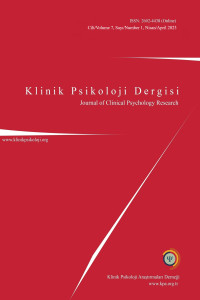Kadınsılık-erkeklik algısının beden algısı ve yeme tutumları arasındaki aracı rolü
The mediator role of femininity-masculinity perceptions between body perception and eating attitudes
Author(s): Fatma Mahperi UluyolSubject(s): Gender Studies, Psychology, Clinical psychology, Health and medicine and law
Published by: Klinik Psikoloji Araştırmaları Derneği
Keywords: eating attitudes; body dissatisfaction; femininity; masculinity; traditional gender role;
Summary/Abstract: It is thought that ideal body norms which is shaped under the influence of Western culture are effective in rapid increase in the rate of eating disorders in recent years. Body norms are gender specific and it is thought that the desire to be thin in women and to be muscular in men increases body dissatisfaction. As these norms are more exposed in Western culture, it is claimed that femininity and masculinity norms over the body are reflected through ideal body characteristics. However, in recent years, it is thought that these ideal body norms specific to gender, due to factors such as communication tools and media, increase body dissatisfaction in other cultures. In this study, in order to test this view, in the Turkish population the mediation effect of femininity-masculinity perception in the relationship between gender-specific body dissatisfaction and eating attitudes was investigated with Process Macro Analysis. The study was carried out with 430 females and 414 males between the ages of 18 and 26 years. In this study, Ben-Tovim Walker Body Attitude Scale, Feminine Thoughts Scale, Male-Specific Body Attitude Scale, Masculinity Role Norms Scale, and Eating Attitude Test were administered to the participants. According to the findings, as the desire to be thin in women and desire to be muscular in men increased, body dissatisfaction also increased. As adherence to norms of femininity in women and masculinity norms in men increased, body dissatisfaction and deterioration in eating attitudes also increased. The mediating effect of gender role norms was not found in women. A low mediation effect of masculinity norms was found between body dissatisfaction and eating attitudes in men. As a result, ideal body characteristics changed according to gender and according to the level of adherence to gender norms, the risk of developing an eating disorder changed.
Journal: Klinik Psikoloji Dergisi
- Issue Year: 7/2023
- Issue No: 1
- Page Range: 75-89
- Page Count: 15
- Language: Turkish

